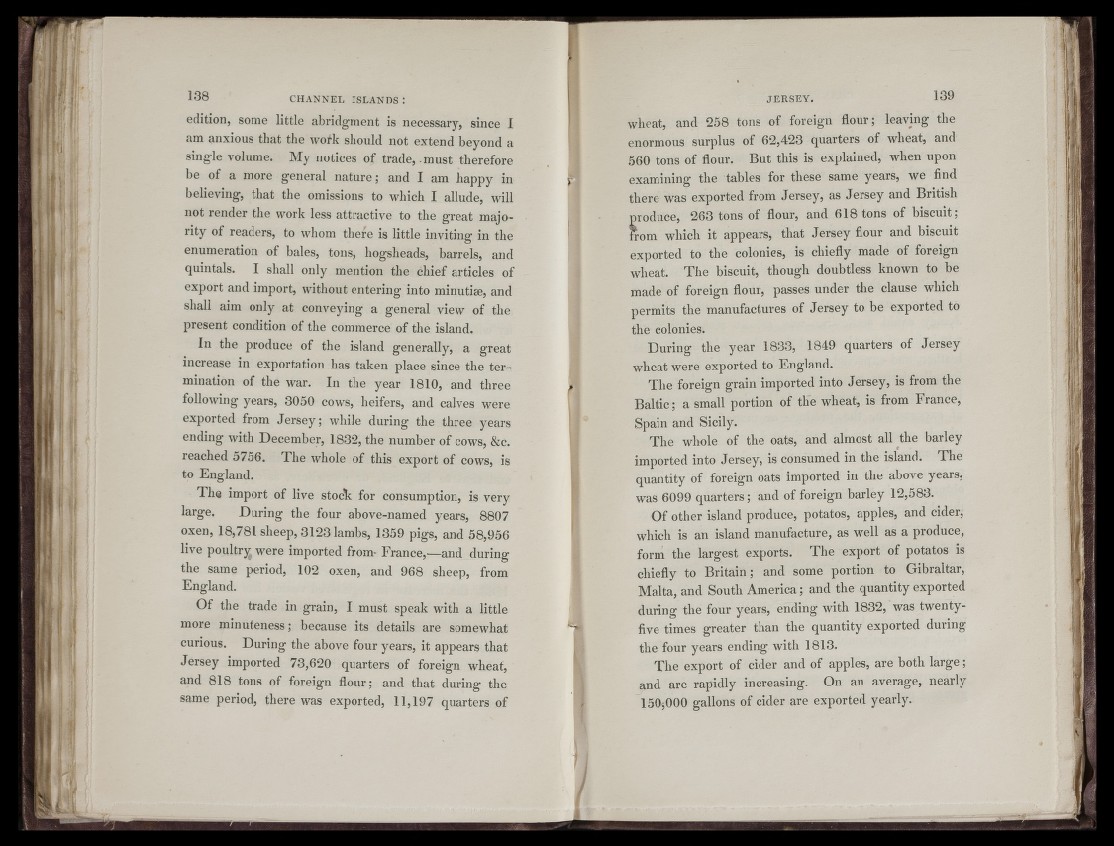
: ip:] 1 ; ' 5: ' ' ■
; G..
MM '
if 1 i
I. Ï
edition, some little abridgment is necessary, since I
am anxious that the work should not extend beyond a
single volume. My notices of trade, - must therefore
be of a more general nature; and I am happy in
believing, that the omissions to which I allude, will
not render the work less attractive to the great majority
of readers, to whom there is little inviting in the
enumeration of bales, tons, hogsheads, barrels, and
quintals. I shall only mention the chief articles of
export and import, without entering into minutiae, and
shali aim only at conveying a general view of the
present condition of the commerce of the island.
In the produce of the island generally, a great
increase in exportation has taken place since the termination
of the war. In the year 1810, and three
following years, 3050 cows, heifers, and calves were
exported from Jersey; while during the three years
ending with December, 1832, the number of cows, &c.
reached 5756. The whole of this export of cows, is
to England.
The import of live stock: for consumption, is very
large. During the four above-named years, 8807
oxen, 18,781 sheep, 3123 lambs, 1359 pigs, and 58,956
live poultry were imported from- France,—and during
the same period, 102 oxen, and 968 sheep, from
England.
Of the trade in grain, I must speak with a little
more minuteness ; because its details are somewhat
curious. During the above four years, it appears that
Jersey imported 73,620 quarters of foreign wheat,
and 818 tons of foreign flour; and that during the
same period, there was exported, 11,197 quarters of
wheat, and 258 tons of foreign flour; leaving the
enormous surplus of 62,423 quarters of wheat, and
560 tons of flour. But this is explained, when upon
examining the tables for these same years, we find
there was exported from Jersey, as Jersey and British
produce, 263 tons of flour, and 618 tons of biscuit;
Horn which it appears, that Jersey flour and biscuit
exported to the colonies, is chiefly made of foreign
wheat. The biscuit, though doubtless known to be
made of foreign flour, passes under the clause which
permits the manufactures of Jersey to be exported to
the colonies.
During the year 1833, 1849 quarters of Jersey
wheat were exported to England.
The foreign grain imported into Jersey, is from the
Baltic; a small portion of the wheat, is from France,
Spain and Sicily.
The whole of the oats, and almost all the barley
imported into Jersey, is consumed in the island. The
quantity of foreign oats imported in the above years,
was 6099 quarters; and of foreign barley 12,583.
Of other island produce, potatos, apples, and cider,
which is an island manufacture, as well as a produce,
form the largest exports. The export of potatos is
chiefly to Britain; and some portion to Gibraltar,
Malta, and South America; and the quantity exported
during the four years, ending with 1832, was twenty-
five times greater than the quantity exported during
the four years ending with 1813.
The export of cider and of apples, are both la rge;
and are rapidly increasing. On an average, nearly
150,000 gallons of cider are exported yearly.